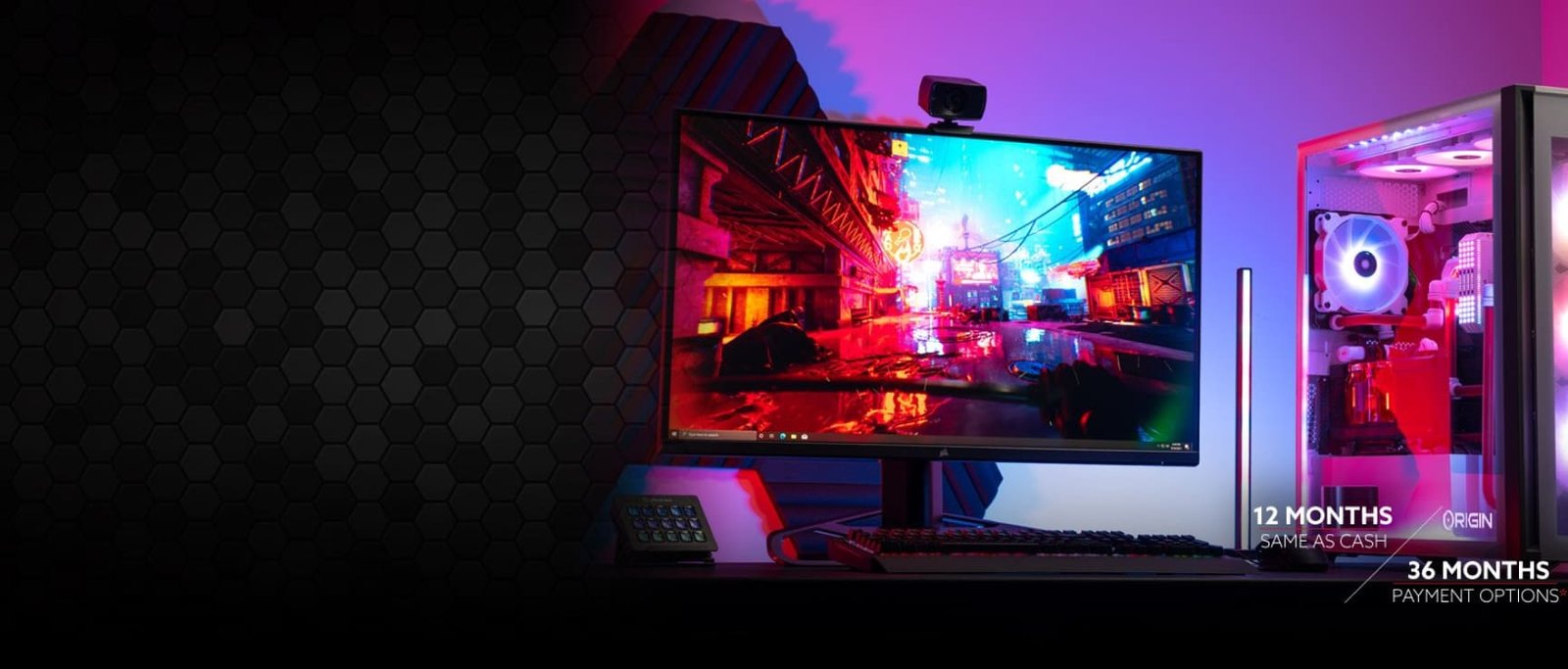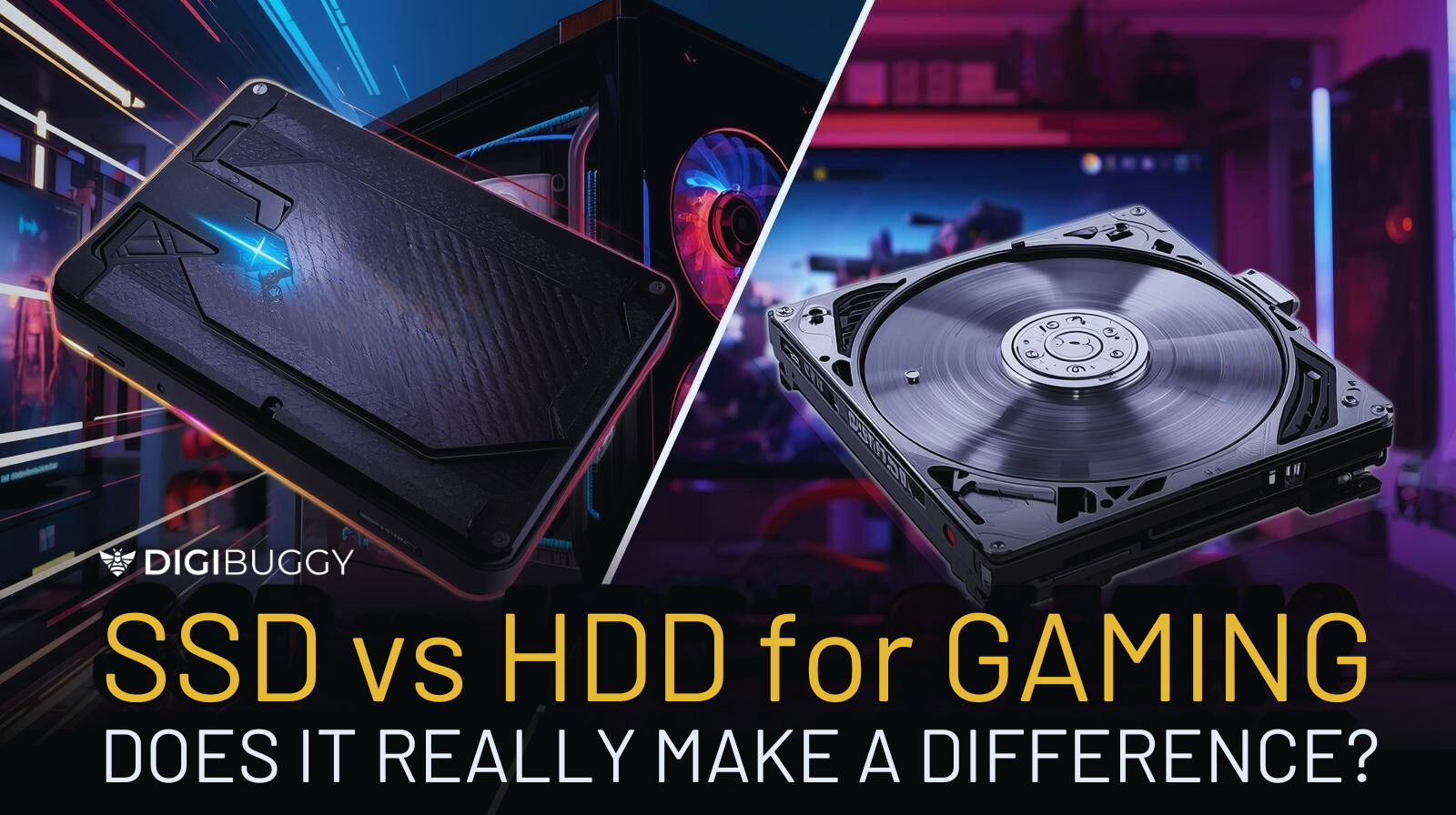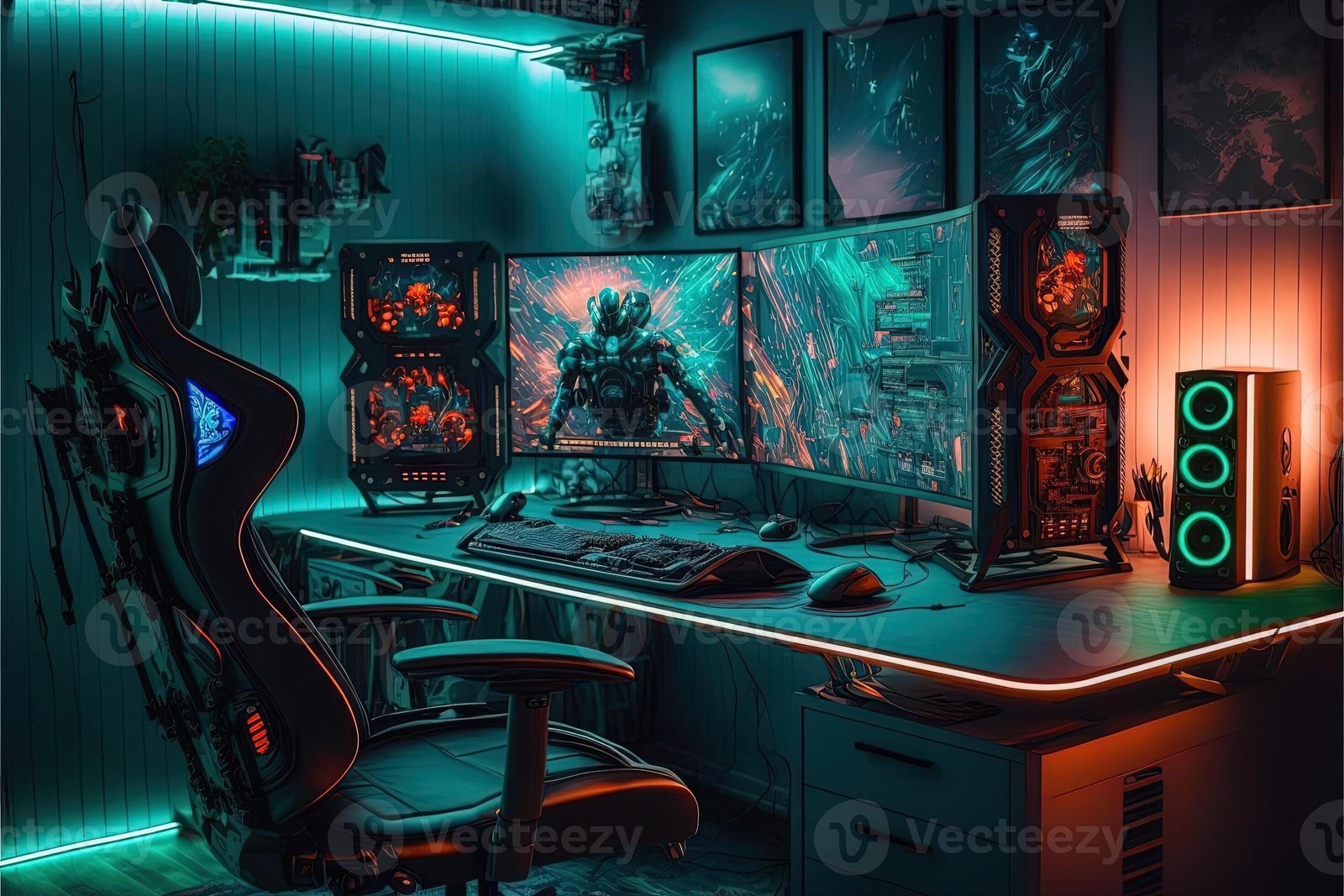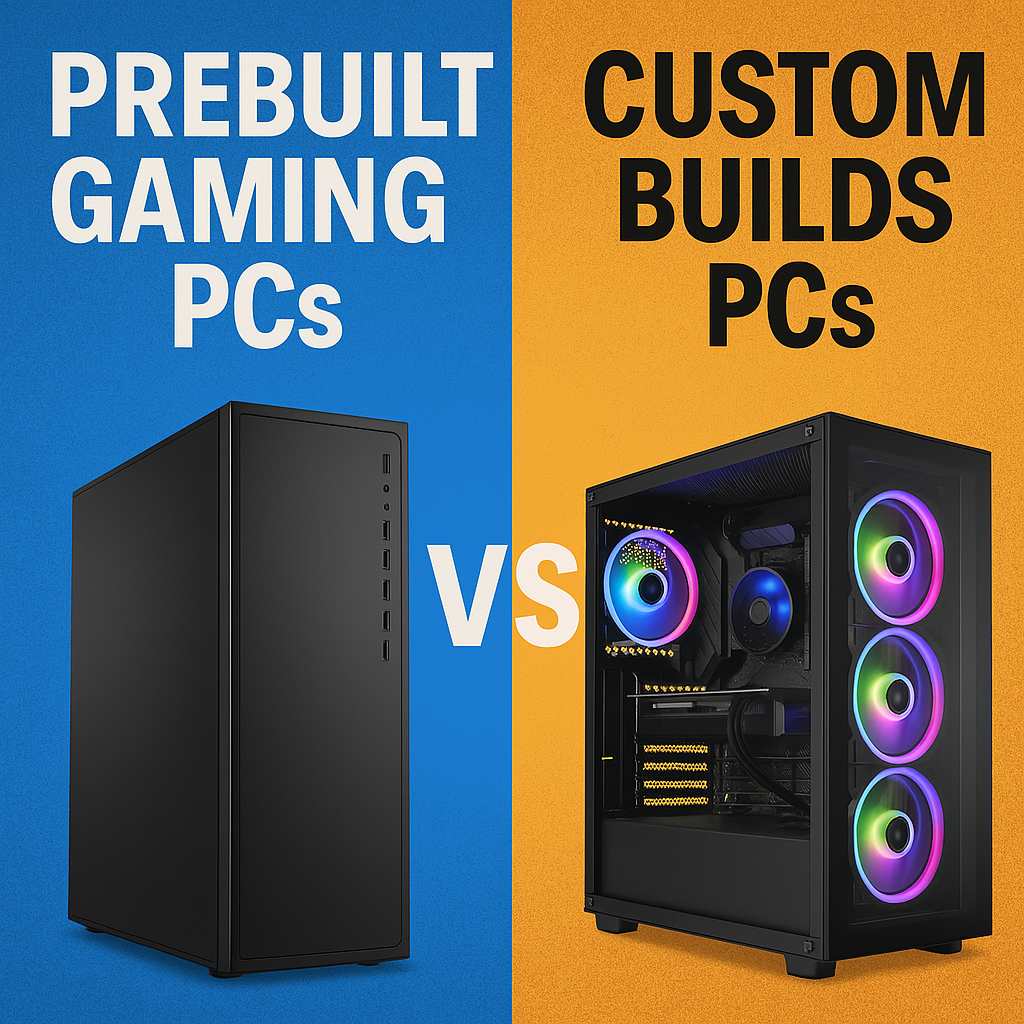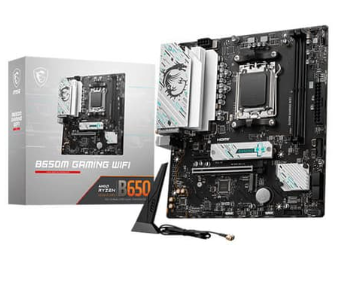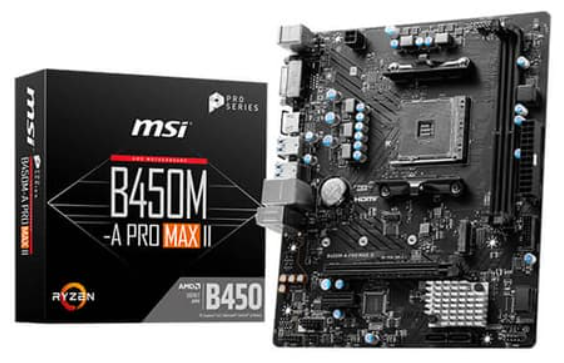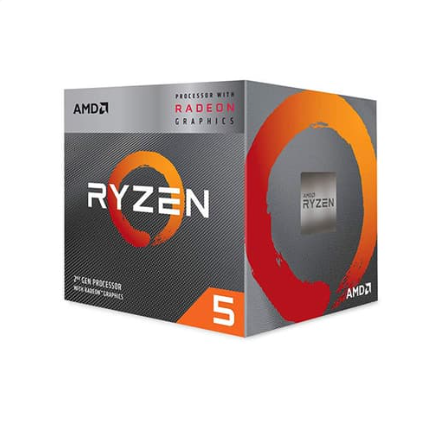You’ve built your dream gaming rig, but one question remains: SSD or HDD?
It might sound like a boring hardware choice, but storage can completely change how your system feels. We’re talking faster boot times, smoother maps, and no more texture pop-ins mid-fight.
In this guide, we’ll break down the real difference between SSDs and HDDs for gamers in India, with benchmarks, pricing, and hybrid setup ideas straight from Digibuggy.
Why the Storage Choice Matters for Gamers
Your storage decides how quickly your games load, how smoothly textures stream, and whether your PC feels “instant” or “laggy.”
What Gamers Really Notice
- Load times: SSDs boot and launch games 3–5× faster.
- Stutters: HDDs often cause micro-pauses when streaming assets.
- Overall snappiness: Menus, level transitions, and even updates install faster on SSDs.
At Digibuggy’s DIY PC Experience, gamers often test SSD vs HDD setups side-by-side, and most describe SSDs as “night and day” compared to HDDs.
SSD vs HDD - Core Differences
Let’s look at how the two technologies compare on key metrics:
|
Metric
|
SSD (typical)
|
HDD (typical)
|
|
Speed
|
500 MB/s (SATA) – 7000 MB/s (NVMe Gen4)
|
30–160 MB/s
|
|
Latency
|
<0.05 ms
|
5–10 ms
|
|
Noise
|
Silent
|
Audible spinning noise
|
|
Durability
|
Shockproof, no moving parts
|
Mechanical, vulnerable to drops
|
|
Power Usage
|
2–3W
|
6–8W
|
|
Price per GB
|
₹7–₹13 (SATA/NVMe 1TB)
|
₹2–₹5 (1TB)
|
The Technology Behind It
SSDs use NAND flash memory, allowing instant access with zero moving parts. HDDs rely on rotating platters, meaning every click and load involves physical movement, which naturally slows performance.
Pro Tip: For balanced builds, use NVMe Gen4 SSDs for your OS and high-end titles. You’ll see dramatic drops in load times and heat.
Benchmark Results: Real-World Tests
We ran popular games across identical setups at Digibuggy, one using a 1TB NVMe SSD, the other a 1TB HDD.
|
Game
|
SSD Load Time
|
HDD Load Time
|
Notes
|
|
Cyberpunk 2077
|
8 sec
|
38 sec
|
Huge texture lag on HDD
|
|
Red Dead Redemption 2
|
11 sec
|
34 sec
|
Noticeable pop-ins
|
|
GTA V
|
14 sec
|
40 sec
|
Frequent stutter in the open world
|
|
Apex Legends
|
9 sec
|
29 sec
|
Map loads smoothly on SSD
|
|
Valorant
|
6 sec
|
22 sec
|
Near-instant match start
|
|
COD: MW3
|
12 sec
|
31 sec
|
HDD struggles with large assets
|
|
Hogwarts Legacy
|
13 sec
|
36 sec
|
Better frame pacing on SSD
|
Source : https://www.youtube.com/watch?v=yB7-VcWTCxo
Across every test, SSDs reduced load times by 65–80%, while HDDs often delayed texture streaming, especially in open-world or high-detail titles.
Does SSD Improve FPS or In-Game Performance?
Let’s bust a myth: SSDs don’t directly increase FPS.
Frame rates depend on your GPU and CPU, not your storage drive.
However, SSDs do make your gaming smoother and more responsive:
- Prevent micro-stutters caused by data streaming delays.
- Reduce in-game hitching when entering new areas.
- Improve overall system responsiveness, less waiting, more playing.
So, while your FPS counter may not rise, your experience definitely levels up.
Hybrid Setup: Best of Both Worlds
Most Indian gamers once used a hybrid setup (SSD + HDD) for a balance of speed and capacity, though in 2025, falling SSD prices make pure SSD builds far more practical for gaming. Still, understanding both drivers' long-term behaviour is key to making the right choice.
|
Setup Type
|
Best Use-Case
|
Pros
|
Cons
|
|
Pure SSD
|
Esports & AAA gamers
|
Blazing fast, silent, durable
|
Costlier per GB
|
|
Pure HDD
|
Archival & backup storage
|
Cheap, stores data longer
|
Slow for active games
|
|
Hybrid (SSD + HDD)
|
Older rigs, mixed use
|
Speed + space combo
|
Extra setup time, less relevant in 2025
|
Data Retention Insight:
- SSDs use electrical charge to store data in NAND cells : if left unpowered, they can hold data for roughly 1 year before gradual degradation starts.
- HDDs rely on magnetic storage, letting them preserve data for 4–5 years without power.
Why It Matters:
If your goal is long-term archiving or offline backups, HDDs still outperform SSDs. But for daily gaming, speed, and overall responsiveness, SSDs are the clear winner in 2025.
Pro Tip:
Use your SSD for Windows and top-tier games, while reserving an HDD for recorded streams, archived clips, or older installs.
Need help balancing both? Check Digibuggy’s Storage Upgrade Guide for hybrid setup ideas and real build examples.
Durability, Lifecycle & Practical Considerations
SSDs last longer than most gamers expect. With modern wear-levelling and over-provisioning, even mid-tier NVMe drives easily last 5–8 years of heavy use.
|
Factor
|
SSD
|
HDD
|
|
Shock Resistance
|
Excellent (no moving parts)
|
Weak (mechanical)
|
|
Thermals
|
Runs cool (~35°C–50°C)
|
Can reach 60°C+
|
|
Lifespan
|
600–1200 TBW typical
|
3–5 years average
|
|
Power Cuts
|
Low risk
|
High chance of data loss
|
Pro Tip: SSDs save up to 40% electricity over HDDs across long gaming sessions, especially valuable in Indian setups with limited UPS support.
Common Myths & FAQs
Q1: Will SSD increase FPS?
No, FPS is GPU-bound. SSDs only eliminate texture loading delays and micro-stutters.
Q2: Do I need an SSD for every game?
No, just your operating system and high-load titles. Keep lesser-played ones on HDD.
Q3: Is upgrading an old gaming PC to an SSD worth it?
Absolutely. Even a budget SATA SSD can make your old rig feel brand new.
Q4: What’s the best SSD for gaming in India (2025)?
WD SN850X, Kingston Fury Renegade, Samsung 990 Pro, and Crucial P5 Plus are the top picks.
Final Recommendations & Use Cases
For Daily Gamers
Go SSD all the way, especially NVMe. It’s the fastest, most future-proof choice.
For Content Creators or Streamers
A hybrid SSD + HDD setup gives you both speed and massive capacity for video files and project storage.
For Budget Builders
Start with a 512GB SATA SSD, then expand later. Even that single upgrade makes your PC feel alive.
If you’re unsure how to configure it, Digibuggy’s Build Consultants can help design your perfect mix.
The Bottom Line
Upgrading to an SSD isn’t about chasing numbers; it’s about feeling the difference.
No more waiting through long load screens, no more stutters mid-fight.
At Digibuggy, we’ve built hundreds of hybrid and all-SSD rigs for gamers across India. Join us for a live DIY build, get your storage optimised by pros, and take home a Polaroid snapshot of your new gaming beast.
Ready to feel the upgrade? Start your build today →

